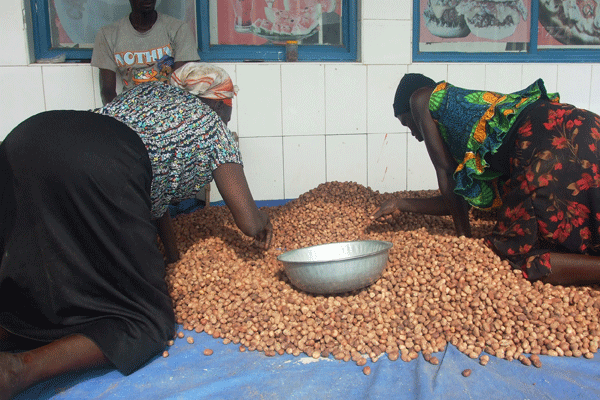Shea nut plant could close over tree cutting

A woman stands near a cut shea tree in Otuke District in 2021. PHOTO/PATRICK EBONG
What you need to know:
Uganda’s variety of shea nut called Vitellaria Nilotica is in high demand in the world market
A shea nut processing factory in Lira City is on the verge of collapse due to the high rate at which shea trees are being depleted.
Sadly, efforts by the National Environment Management Authority (Nema), local and traditional leaders to promote the sustainable use of indigenous tree species are being frustrated by community members that have resorted to burning charcoal as an alternative means of livelihood.
Mr Singh Surjit, an Indian investor, is now worried that his factory, which manufactures cosmetic and laundry products out of shea butter, might end up closing.
The investor injected more than $40 million to set up a modern shea butter processing industry in Lira, both for the local market and export. The factory became operational in 1989.
Mr Singh said Uganda’s variety of shea nut called Vitellaria Nilotica is in high demand in the world market, but the community in Lango Sub-region, where the tree grows naturally, is cutting them for charcoal burning.
In the Lango Sub-region, shea trees are mainly found in Otuke and Alebtong districts.
“We have been trying to tell the government that this is a tree that grows naturally. It takes 25 to 30 years to mature and give the fruits but unfortunately some people cut them to make charcoal,” Mr Surjit, the managing director of Guru Nanak Oil Mill and Shea Butter Uganda Company, told Daily Monitor on Monday.
He added that charcoal made from shea trees is sold in Kampala and Kenya. Traders dealing in this lucrative business are doing it illegally since shea tree was declared a protected species facing extinction by a presidential directive in 2017.
“We have tried to stop it. We wrote to the Ministry of Water and Environment, we approached His Excellency the President and they assured us they will make sure people stop cutting the tree, but people are still cutting it,” Mr Surjit said.
“Somebody cuts a tree in one day, makes charcoal, and gets Shs50,000 or Shs100,000 from one tree, which is not viable. But if you get shea nut from that tree and you sell it, you get more money than from charcoal,” he said.
Mr Surjit also requested the government to rehabilitate rural roads where shea trees are located so that they can easily monitor its illegal cutting.
“Most of the rural roads where the shea trees are found are in bad condition. So, we cannot travel deep in the villages where tree cutting is rampant to sensitise the community on the benefits of conserving these trees,” Mr Surjit said.
Ms Beatrice Akello Akori, the state minister for Economic Monitoring, said she recently met Mr Surjit in Lira and they discussed ways to stop the cutting down of shea trees.
“Locals have not been looking at it as a source of income, but rather as edible oil only and yet they can make money out of it,” Ms Akello, who is the Agago District Woman MP, said yesterday.
She said the government is focused on getting people out of poverty through social economic transformation.
Most-prone areas
Mr Francis Abola, the chairman of Otuke District, acknowledged that the indiscriminate cutting down of indigenous tree species is rampant in the sub-counties of Bolilim, Ogwete, Ogor and Okwang.
There are 14 sub-counties in Otuke.




